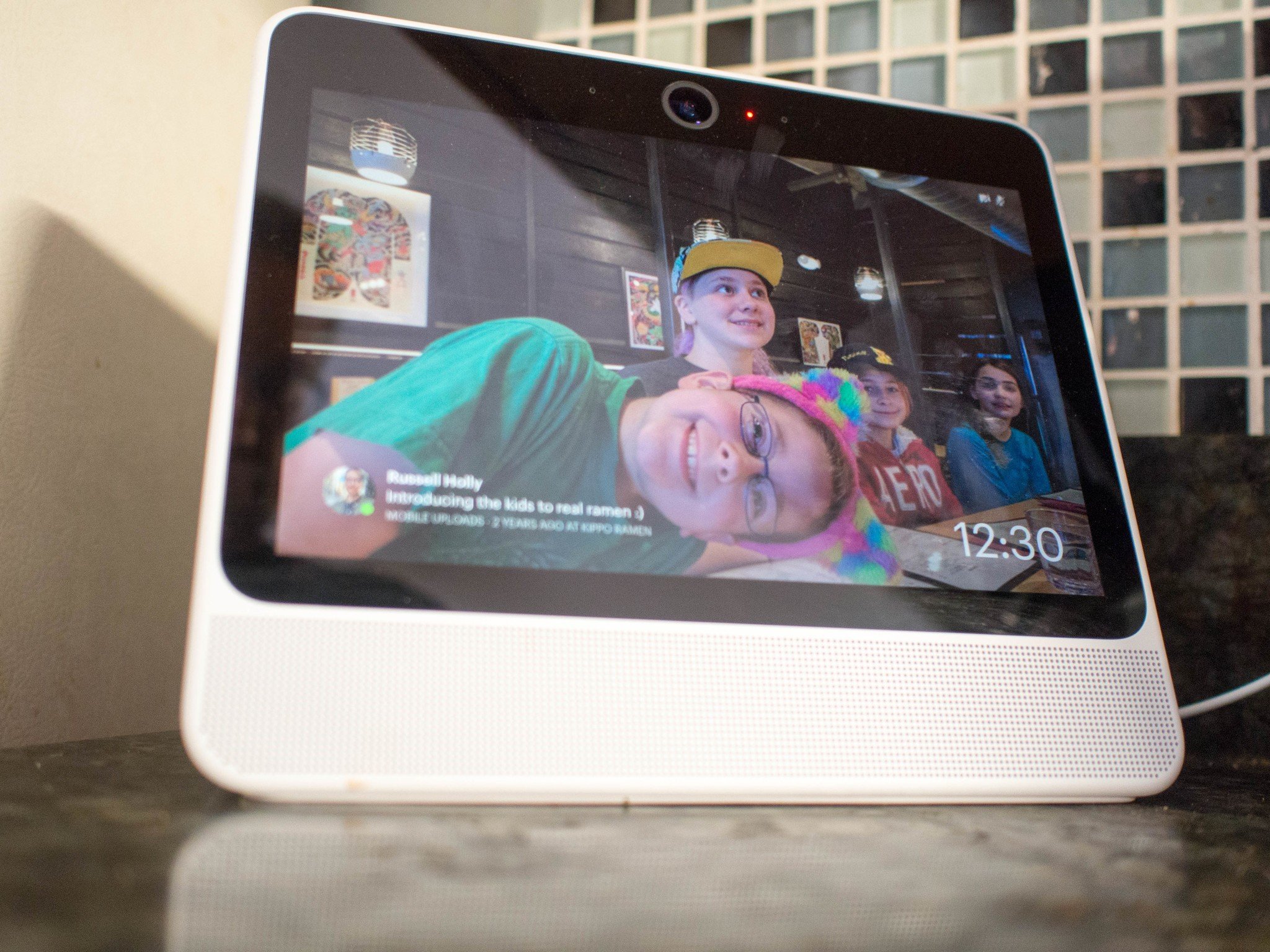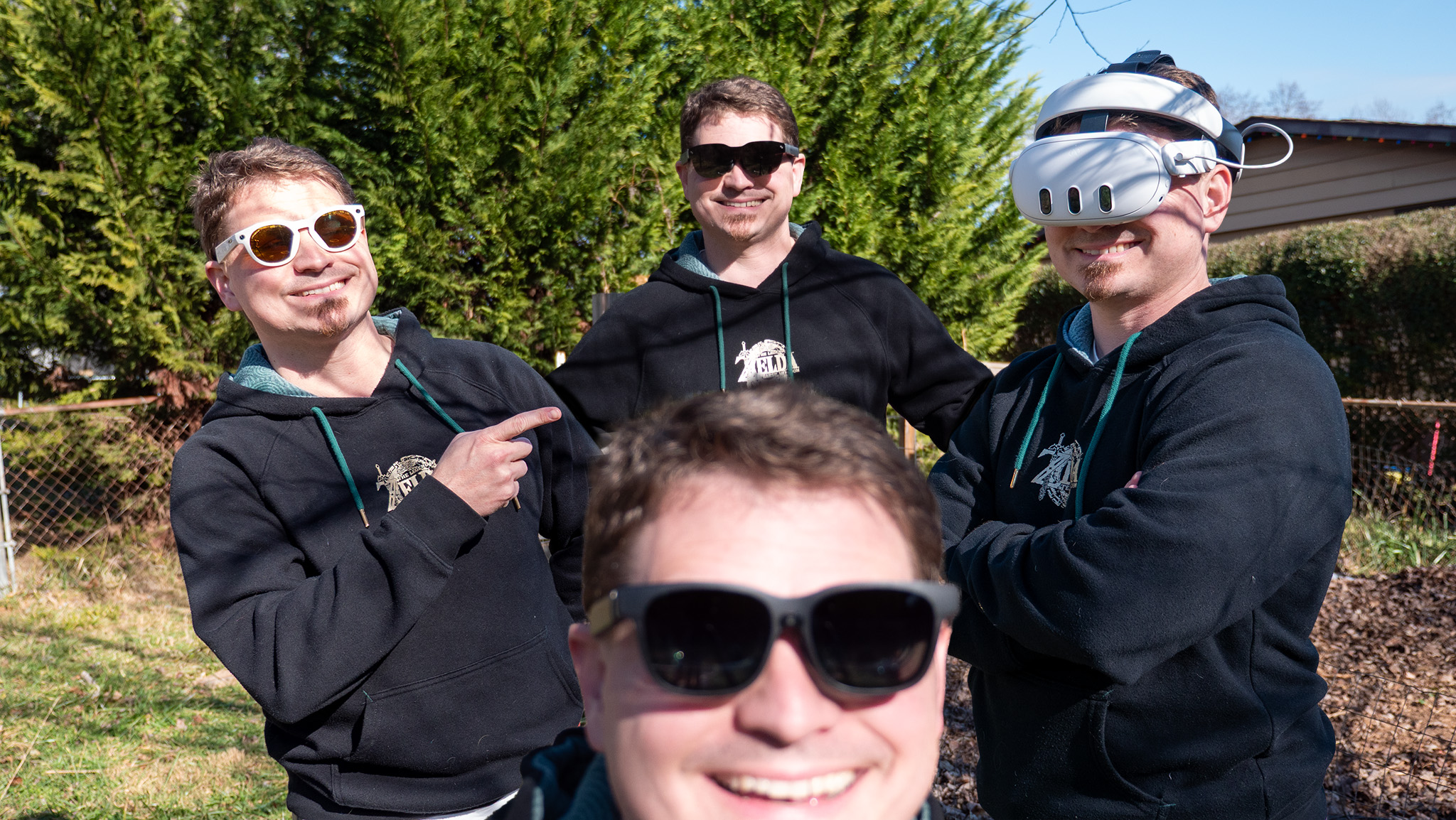Having a smart display in your home means different things to different people. Some like having a nice connected digital photo frame that also occasionally answers questions and controls smart home tech. Others enjoy using these displays as a whole home hub, with information for each person in the house and sort of mission control for music throughout the house.
Me? I like having these displays in the kitchen, where they can be a television and a recipe book and a podcast delivery mechanism when I need them without touching my phone. One thing I didn't expect to want was a way to use these speakers as a phone, which both Google Home and Amazon Echo products allow. But now, thanks to Facebook, I now want to ditch phone calls in exchange for video chat. Because, for the first time ever, I found a video chat system that isn't a chore to use.
The Good
- Excellent video chat system
- Facial recognition features are fun and functional
- Bedtime stories are cute
The Bad
- Sound quality is just OK
- Confusing Alexa/Portal "integration"
- Facebook has partial access to a camera and microphone in my house
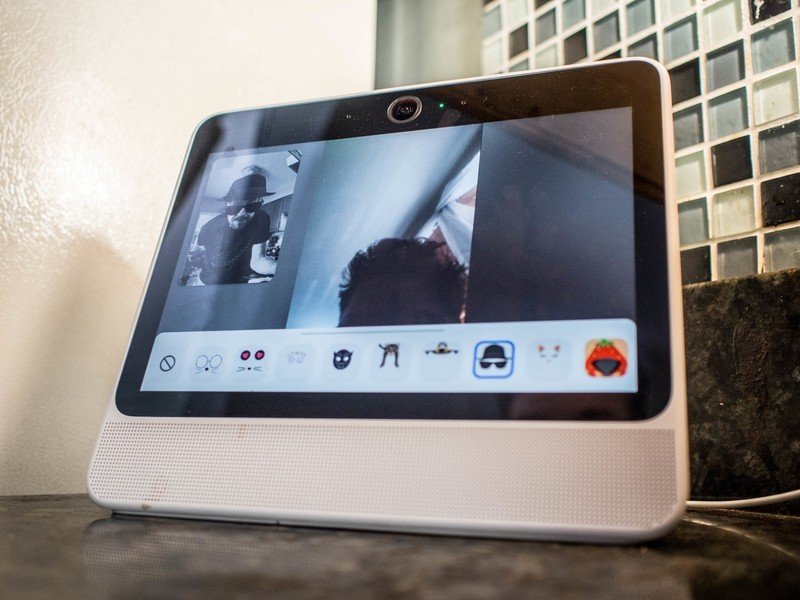
Portal from Facebook What I like
Like most smart displays, Facebook Portal acts as a great connected photo frame when you're not using it. But unlike other smart displays, you have access to your Facebook photo library. This is great news for people who organize their Facebook photos into folders, but a little clumsy for people who automatically dump everything into the Mobile Uploads folder by default. Each photo offers the text you associated with it when sharing to Facebook, which is a nice touch. If you're not a huge Google Photos user, this is probably the best connected photo frame you can buy.
With a Portal, you have access to a massive user base the other smart displays simply don't have the ability to replicate. Facebook Messenger is ubiquitous, and something almost everyone I know has access to even if they don't use it very often. Compared to the Amazon and Google video chat services, Facebook Messenger is a global juggernaut. And in the first few days of using Portal, I found myself using Messenger a lot more just because it was now noticeably more convenient to do so.
More than anything, Portal is a demonstration of just how advanced the Facebook Messenger video chat system is.
Portal includes a Home and Away feature, which automatically routes calls through Messenger to from your phone to Portal if it knows you are close to it. This requires giving Facebook Messenger access to your location, but it's an opt-in feature which is a nice step forward for Facebook and privacy. And it works: as soon as I got home, if someone called me on Facebook Messenger my Portal would ring instead of my phone. This meant I could say "Hey Portal, answer" to connect the call if I happened to be wrist-deep in a meatloaf I was making, something you can't do through Messenger on your phone. Hanging up a call requires a similar voice command, but it all worked exactly as advertised each time.
Get the latest news from Android Central, your trusted companion in the world of Android
Video calls on a smart display aren't new, but the software Facebook is deploying here is remarkable. Portal locks on to my face and zooms in, then follows me around the room as I do things. My Portal was set up in the corner of my kitchen, so the super wide angle fisheye lens on the front of Portal could see the entire room. This means no matter where I am in my kitchen, Portal was able to zoom in on me as though I was standing right in front of it. The video moves slowly and deliberately so it's not too jarring for the person on the other end of the call, and it's all done through software. There are no moving parts on this camera, which is incredible.
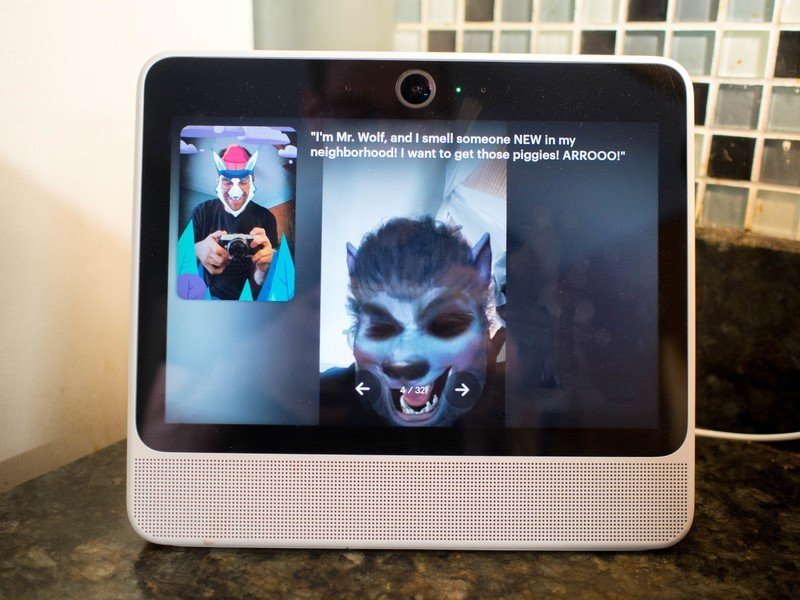
This facial tracking software lends itself to several other features in the camera, each impressive in its own way. It wouldn't be a Facebook camera without augmented reality glasses and masks to play with, and while the selection isn't as complete as the actual Facebook app, there are some fun options. If multiple people are in the field of view, you can choose which one Portal follows or just let it follow whoever is physically closer to Portal. As it follows that person, the microphones work to lessen the other sounds in the room. I had a pan of bacon sizzling right next to Portal on two separate occasions, and the person on the other side of the call couldn't hear it at all over my voice, even though it was pretty damn loud.
Weirdly, my favorite feature combines all of this cool tech for a kid-friendly bedtime story feature. Facebook Portal has four short stories baked in right now, and when you select one the person on the other end of the call is treated to a tiny theater where you perform the story with sound effects and face masks. The words for the story show up on Portal, and as you read them aloud the animations around your face help tell the story. I could walk around the room and tell this story, and the person on the other end still got the whole experience. Just from a technical perspective, it was incredible to see how smoothly it all came together. More than anything, Portal is a demonstration of just how advanced the Facebook Messenger video chat system is compared to the competition right now.
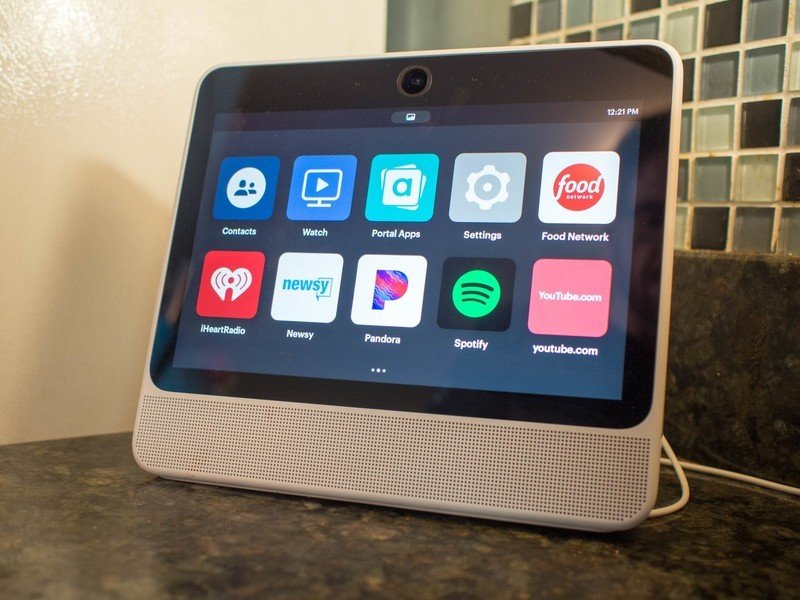
Portal from Facebook What I don't like
While the front of this smart display is largely glass that is fairly easy to clean, the speaker grille just under the display is not. I splashed some Korma on my Facebook Portal the first day I was using it, and three days of trying to clean it out of these little speaker holes proved unsuccessful. This kind of thing is likely less obvious on the matte black version, but this white model captures just about everything and leaves you wanting to clean it constantly.
As great as Facebook Portal is at being a video chat box, that's exactly how not great it is at being a smart display. You say "Hey Portal" to access a handful of Facebook-specific features, but everything else uses Alexa and requires a separate set of voice commands. This version of Alexa isn't as complete as what you find on an Amazon Echo Show, including video chat between Portal and any other video-enabled Alexa system.
The video streaming options on Facebook Portal aren't bad, but it's a strange mix. Portal comes with Facebook Watch, YouTube via the web, Newsy, and Food Network. There's a Portal App library where you'll be able to install more apps in the future, but none of it really comes together as cleanly as it does on the Google Home Hub or Amazon Echo Show. You can't really ask Portal to watch a specific episode of a show, for example. The UI for this part of the experience is very finger-focused, which is unfortunate given how good the microphones are.
It's almost like the smart display features were an afterthought, something Facebook was still building at launch.
I live with multiple people with their own Facebook accounts, but Portal doesn't support multiple accounts or voice-specific data access so I'm the only person who can use Portal to talk to friends. This is a huge oversight when you consider one of the biggest selling points to this device is the understanding that just about everyone you know has a Facebook account, and one I hope is addressed soon.
Portal offers multiple audio streaming options, but the speaker on Portal is not particularly well tuned for music. It's great for spoken word conversations, but music through Portal is pretty mediocre. And Portal can't connect to any other smart speakers right now, so you're only getting this music right where you are. It's fine for a smaller room, but the competition has whole-home ecosystems for music, and that's a big advantage.
And really, that's my overall opinion of Facebook Portal as a smart display. It's... fine. There's nothing about this part of the experience it does particularly well, but you can get most of the features you see prominently displayed on the competition if you go looking. It's almost like the smart display features were an afterthought, something Facebook was still building at launch.
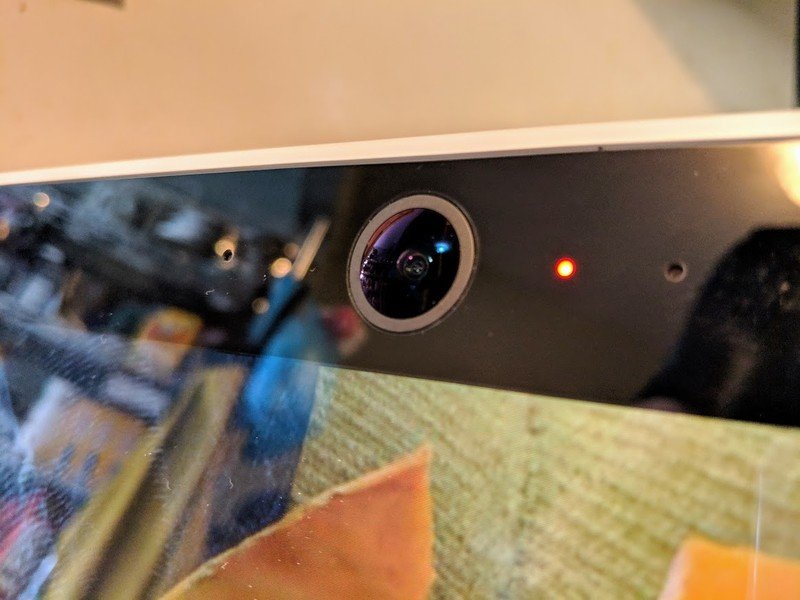
But what about privacy?
Facebook has had no shortage of very serious privacy issues over the last year, and as a user, I've never really felt like Facebook addressed them in a way that convinced me history won't repeat itself. But even looking at Facebook Portal through that lens, I'm not concerned about the hardware listening in on me when I don't want it to. The camera and microphone can be disabled with a button, and there's a bright red light to let you know it can't hear you. Facebook included a separate physical camera cover if that's not enough for you. Every part of Facebook having access to your data is an opt-in experience through Portal, and since most of your voice commands go through Alexa it's not like Portal can slurp up all of your voice commands for advertising.
That having been said, Facebook fully intends to use Portal as an advertising platform. It's unclear what form that will take because it's not active right now. But it's not difficult to imagine ads in Facebook Watch and ads showing up in the digital photo frame in between your pictures. Again, not a thing we're seeing right now, but something Facebook has already said it wants to do and something I can imagine would sour me on this experience fairly quickly.
Facebook Portal has access to exactly as much data as you let it, which is the same thing you can say about Amazon and Google when it comes to smart displays. For the moment, I'm not any more or less concerned about a privacy breach through Portal than I am my Amazon Echo Show.
Should you buy it? If you like Facebook Messenger, yes
I can't stress enough how good Facebook Messenger through Portal really is. It really says a lot about how advanced Facebook Camera is, or could be very soon. If you use Facebook for video chat a lot, this is a great system. And if you aren't really sold on the idea of video chat, I suggest you go try this out in a store. And the deal most electronics stores have right now is two smaller Portals for $300, which is a pretty good deal if you want someone else in your life to have a Portal, too.
3.5 out of 5
But if you don't use Facebook Messenger, and are just looking for a great smart display, this is not what you want. And it's not clear Facebook is going to be able to fix some of the bigger issues with music and apps fast enough to justify picking one up anytime soon.

